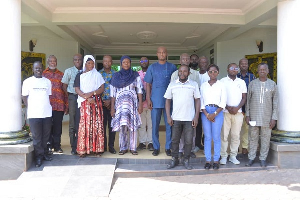 Executives captured in a photo
Executives captured in a photo
As part of efforts to sensitize farmers and consumers on the commercialization of Genetically Modified Organisms (GMOs) to be imported into the Ghanaian market, the Center for Indigenous Knowledge and Organizational Development (CIKOD), has organized a review and planning workshop with Members of the Ghana Agroecology Movement in the forest zone and key stakeholders in farming to streamline issues in the Agricultural sector.
Participants include Civil Society Organizations, District Directors of Agriculture, farmers, and the media.
The workshop sought to review their activities during the past year and charted a new path for 2024 and discussed strategies for local seed development in the forest zone.
Since 2009, CIKOD, ActionAid Ghana, and the Peasant Farmers Association of Ghana (PFAG) have been facilitating the strengthening of the Ghana Agroecology Movement as a Civil Society Organizations-led platform that is championing Agroecology issues in Ghana.
Addressing the workshop, Deputy Executive Director of CIKOD, South, Mr Wilberforce Laate said the main objective of the platform is to build a Movement made up of well-informed multi-stakeholder membership, organized in structure and function, promoting Agroecology practices as well as advocacy activities in Ghana.
"The platform also seeks to influence Agricultural policy on food systems that impact positively on Agricultural development and the environment including the well-being among identifiable food value chain actors in Ghana."
Mr Laate said over the past few years, CIKOD has collaborated with other partners to strengthen the concept and practices of Agroecology among members of the Ghana Agroecology Movement in the Forest zone through workshops, caravan tours, and others.
He said Parliament passed the Bio-Safety Act in 2011 and the Plant Variety Protection Bill (Plant Breeders Bill) in 2020.
Mr Laate reminded stakeholders in Agriculture that GMOs are false solutions and do not meet the challenges of food security in Ghana.
He advised CSOs, farmers, and other stakeholders to come together to promote local seeds for planting and consumption.
He advised farmers to venture into Agroecology and organic farming on a large scale to demonstrate its relevance for policymakers to make informed decisions.
National President of the Peasant Farmers Association of Ghana, Mr Wepia Addo Awal Adugwala said GMOs are seeds developed in the laboratory adding that their presence in Ghana will not solve food security.
He reminded policymakers that the problems bedeviling Ghana's Agricultural sector have nothing to do with GMOs.
Mr Awal Adugwala identified irrigation, mechanization, and access to markets as some of the pressing issues militating against Agricultural practices.
He said a lot of farmers in Northern Ghana and the middle belt produce a lot of food but have no ready market.
The President of PFAG urged the Bio-Safety Authority to label foods properly on the market to make a distinction between the two.
He called on leaders to educate their farmers that "our traditional seeds are still the best."
Mr Awal Adugwala urged government to continue to invest in local seeds and support institutions like the Council for Scientific and Industrial Research to improve on local varieties that can withstand climatic conditions.
The workshop agreed on concrete steps to strengthen the Agroecology movement in the forest zone.
It also discussed the implications of the commercialization of the 14 novel GMO products comprising 8 maize and 6 soybean products by the National Bio-Safety Authority on the Ghanaian market.
The workshop shared experience on the production and marketing of Agroecology products in the zone.